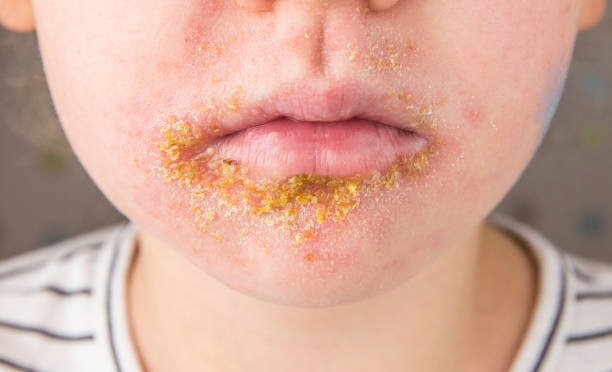Has your child come home with mysterious blisters on their skin? It’s more common than you think—and school sores, also known as impetigo, are a frequent concern for parents. While it can be uncomfortable and spread quickly, impetigo is usually mild and treatable, especially with your community pharmacist’s help.
Impetigo causes sores and blisters on the skin, typically affecting children in schools and childcare centres. The infection can spread easily through direct contact or shared items like towels and bedding.
What causes impetigo?
Impetigo is caused by Staphylococcus or Streptococcus bacteria that can enter the skin through a scratch, insect bite or through conditions like eczema. Once the bacteria settle in, they cause the small blisters and sores that impetigo is known for. This is why it’s especially common in children who are more likely to have cuts or scrapes from playing, but remember, even healthy, unbroken skin can sometimes develop impetigo, which is why it’s important to get on top of it as soon as possible.

How to spot the symptoms
Not sure if your child’s rash is impetigo or something else? Impetigo typically starts as red sores or blisters, which can grow rapidly and then burst, leaving behind a crusty, yellowish area. The sores may be itchy and, in some cases, can merge into larger blisters.
Symptoms can normally appear within 1 to 3 days for streptococcal infections or 4 to 10 days for staphylococcal infections. If you notice fever, swollen glands, or your child feeling unwell, it might be a sign the infection is getting worse.
How contagious is it?
Impetigo is highly contagious, especially when the blisters are oozing. It spreads through skin contact or by touching objects like toys or towels that have been in contact with the sores. To prevent further spread, children with impetigo should be kept home from school until treatment begins and the sores are covered with a dressing.
It’s also very important to keep children with impetigo away from newborns, as a baby’s immune system has not fully developed, meaning the infection can be more dangerous for them.
How can my community pharmacist help?
If you think your child has impetigo, your community pharmacist can help with the right advice and treatment. For mild cases, they might recommend an over-the-counter cream or ointment to help clear up the infection. In more severe cases, they may refer you to a doctor for antibiotics.
It’s essential to follow the full course of treatment, even if the sores seem to clear up early. This will ensure the infection doesn’t come back.
Tips for preventing impetigo
To stop the infection from spreading, ensure:
Your community pharmacist can do more
If you or your child has impetigo, your community pharmacist can help. Discover whether your community pharmacist can provide more treatment and advice for minor skin conditions such as impetigo, as well as eczema and shingles.



